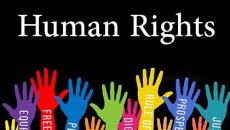What’s in a Word(s): Human Rights?
By Al Murdach, LCSW (retired)
This column explores the meanings behind words that are significant today for social work professionals because they relate to major issues confronting the field. Today’s words are: Human Rights.
The notion of human “rights” is enshrined in numerous historical documents, such as our Declaration of Independence and the more recent United Nations Declaration of Human Rights. Because of historical forces the idea of “rights” as claims for expression and the granting of freedom to a wide variety of conditions, simply because they are human characteristics, has expanded immensely over the past 50 years.
Historically, social work as a profession has focused its attention on human needs rather than rights. Lately, this focus has come under attack by critics both as being overly paternalistic since it allows the profession to assert it best knows what constitutes human needs, rather than allowing the groups and individuals it serves to claim what they themselves believe are their most pressing needs. This has led the profession to focus on preventing injustice in the world and to honor the neglected rights of others rather than simply addressing their needs. This enlarged emphasis on legal rather than moral principles to guide practice has led to a proliferation of classes, workshops and required training for practitioners in such areas as professional ethics codes, liability, informed consent and standards of practice.
When the framework under which social work operated was primarily based on morality, in which doing “good works for the benefit of others” constituted a standard of practice, the field could congratulate itself that it was fulfilling its mission. However, when the operating framework changed to one of codified standards and legal requirements, it became important to accurately measure how well social work has actually done its job. Thus far the results appear to be mixed.
Critical historians, for example, inside and outside the profession have weighed in on the issue of how well client consent and informed client decision making was honored by social workers in the era of “child saving” (late 19th and early 20th centuries) when children were routinely removed from homes and parents deemed “unfit” and placed miles away with more “worthy” families or in large congregate institutions. Likewise, other authors have examined the ways in which early social workers helped to develop “Americanization” programs that, they hoped, would turn immigrants into law abiding, middle class, truly “American” citizens and thus forcibly deprive them of their cultural roots. More damningly, some critics have detailed the assaults on basic freedoms incurred by social work’s complicity with the “relocation program” enforced upon Japanese-American citizens during World War II. Finally, some historians of late have also leveled serious charges of deceit and heavy handedness in the poverty programs once championed by social work during the years of the Great Depression in the 1930s and the Johnson administration’s Great Society in the 1960s.
But we shouldn’t just consider our mistakes. After all other professions, such as medicine, have worse records (e.g., see The Unkindest Cut by sociologist Marcia Millman). It has to be said that social work has also had some spectacular successes in improving care and advancing human rights in such areas as corrections, family welfare, addiction management, and mental health plus in other specialties too numerous to mention.
Finally, we must ask: What is to be done to ensure our field does not again fall victim to some of the human rights failures noted above. In an article in the April 2016 issue of Social Work, author Elizabeth Kiehne recommends that social workers adopt a “Latino Critical Perspective” similar to that advocated by Liberation Theology and authors such as Paulo Freire. This perspective would, it is claimed, attune practitioners to the realities of the oppressive social structures within which they must sometimes work and enable them to realistically seek reform and reformation from within their organizations and within their own practice. It could, in other words, help them to work with their clients to achieve more just power arrangements in social programs. In the same issue other authors advance the idea of “Professional Resistance” to achieve similar goals. It does appear, therefore, that in this new era of greatly expanded human rights the times for social work practice, to quote Bob Dylan, “are a’changin.’”











